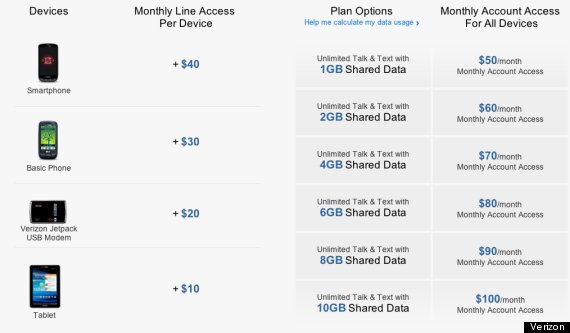
In August, AT&T will follow Verizon's bold lead and introduce shared data plans, something that apparently is the future for mobile phone bills.
Verizon has effectively killed off its unlimited data plans. ( You'll probably be forced to give up yours the next time you upgrade your phone.) And though AT&T will let customers with grandfathered unlimited data plans keep them for now, most observers expect the worry-free unlimited plans to soon disappear.
If you're one of AT&T's and Verizon's 200 million subscribers, you might be choosing a new data plan in the near future. How should you make your decision?
KNOW WHAT YOU'RE SIGNING UP FOR
The key word in a shared data plan is obviously "shared." Instead of paying for data on each individual phone, tablet, netbook or whatever device a family member owns, you pay for a pool of data shared by everyone. In other words, if you have a family of four, instead of purchasing a 2 gigabyte data plan for Dad, a 1GB data plan for Mom, a 6GB data plan for Junior and a 4GB data plan for Scout, you could just opt for a 12GB data plan, with the four of you sharing those 12GB however you'd like.
It doesn't matter how you budget or split up that data over the month: As long as your family does not use more than 12 GB, you don't have to pay overage fees. You simply pay a flat fee for your pool of data and then a fee for each device needing access.
KNOW HOW MUCH DATA YOU USE BEFORE YOU CHOOSE
Each of the four major mobile carriers makes it easy to track your data usage by month. We have covered how to check that information here. But generally you just log into your account on your carrier's website and find the "My Usage" section or the equivalent. Go back six months or so and tally up how much data you and everyone else in your family has typically used.
Find the month when your family used the most data and consider the plan offering the least amount of gigabytes that is still higher than the amount from your family's most data-hungry month. Because of the high overage costs ($15 per gigabyte), you don't want to get caught exceeding your data limit. For both AT&T and Verizon, it will cost $15 per gigabyte exceeded, which can get expensive very quickly.
KNOW THE PLANS
Once you've determined how much data your family customarily eats through, it's time to choose a plan.
Here are AT&T's rates:

And here are Verizon's:

The Wall Street Journal has an excellent Shared Data Plan Calculator that illustrates exactly how much you'd be paying a month on AT&T and Verizon, given the number and type of devices owned by your family. You can use that tool here: Simply plug in how many mobile devices you need covered and the types and the calculator will spit out what you'd pay for AT&T and Verizon. Put away your pad and paper, and take advantage of the Journal's handy spreadsheet.
KNOW YOUR COVERAGE
This might seem obvious, but if you've been getting a weak signal from your carrier for a few years, it might be time to switch. PC Magazine has a great study, which was released in June, that ranks the fastest mobile carriers by city in 30 of America's largest ones. This handy resource -- along with the various price points -- should guide your carrier choice.
KNOW YOUR OPTIONS
Though AT&T and Verizon are the two largest carriers and appear to be shifting to shared data, dozens of other mobile companies offer more traditional plans that might work better for your data or financial needs. If you're single or pay for only your mobile phone bill, those plans are especially attractive (and could save you money or work better for families).
Sprint's unlimited plans take the data guesswork out of your choice and remain the best option for heavy data users. T-Mobile, too, offers unlimited plans, as well as cheaper individual plans, in its effort to catch up to the big guys.
Spurred by dissatisfaction with the major carriers, prepaid plans -- whereby you pay for a set amount of data and talk minutes each month but need not sign a two-year contract -- are also apparently gaining in popularity. Recently, Apple approved sales of its iPhone on prepaid carriers Virgin Mobile and Cricket, lending increased legitimacy to the option. CNET found that customers could save about $1,000 in two years of iPhone ownership should they go the prepaid route instead choosing a contract.
Whether you and your loved ones should sign up for a shared data plan or opt for unlimited, prepaid or individual plans really depends on your monthly data usage as well as the family's budget. Optimally, you would spend as little as possible to get the most solid reception you can.
Use the tools above to find the carrier with the best cell coverage in your city, determine the number of gigabytes your family needs in a month, calculate your potential savings or added expenditures with a shared plan, and explore your other options. You should be able to save some cash and (hopefully!) be happier.